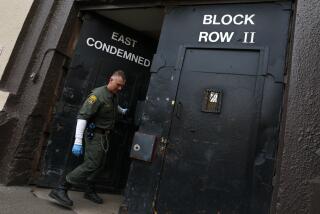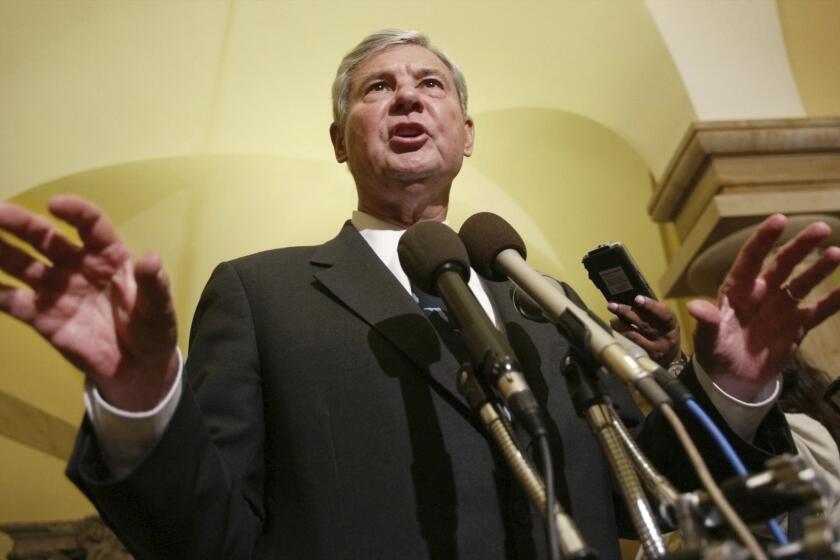Bush Is Now in Step With His Generals
Much of the rhetoric was familiar. But in his U.S. Naval Academy speech Wednesday, President Bush seemed to accept the hard realities both on the ground in Iraq and politically in the United States by pledging a smaller American force.
After months of a lingering disconnect between the White House and senior military commanders, Bush’s comments at the academy in Annapolis, Md., seemed to bring him into line not just with America’s military but with much of his administration.
Repeatedly, military commanders have made the case that only a drawdown of U.S. troops would make Iraqi forces take control of their nation’s security.
On Wednesday, Bush finally seemed to buy into the argument. The revised mission would reduce the exposure of U.S. troops to enemy attack and the potential for U.S. casualties.
In many ways, his speech was an artful domestic tightrope walk, one in which he forcefully rejected his critics’ calls for an immediate troop pullout -- or even a timetable for one -- and repeated the applause lines cherished by his core supporters.
“I will settle for nothing less than complete victory,” he said at one point. “We will stay as long as necessary to complete the mission.”
Yet behind these words, Bush’s glowing assessment of the progress of Iraqi forces provided a response to two of his most crucial political constituencies: his core supporters desperate for reassurances that a plan exists for the victory he has so often promised, and the growing number of supporters-turned-skeptics who now demand a viable exit strategy.
The thrust of Bush’s remarks easily dovetailed with earlier statements made by his two top commanders in the region, Army Gen. John P. Abizaid, head of U.S. forces in the Middle East, and Army Gen. George W. Casey, the military’s senior officer in Iraq.
In Senate testimony two months ago, the two generals had argued that a smaller U.S. force was necessary because the very presence of Americans was fueling the insurgency and fostering a dependency on a continued U.S. presence by the nascent Iraqi security force.
“We believe at some point, in order to break this dependence on the ... coalition, you simply have to back off and let the Iraqis step forward,” Abizaid and Maj. Gen. Douglas Lute, operations director for the Middle East, told reporters in August.
In private conversations, U.S. military officers also have expressed concern that trying to maintain current troop levels in Iraq beyond next year could irreparably harm recruitment efforts and retention levels -- the lifeblood of America’s volunteer military.
Still, those following the events in Iraq question Bush’s upbeat characterization of Iraqi forces and caution that placing so many of his political chips on a strong performance from Iraq’s fledgling troops carries its own dangers. Such forecasts have been made previously, and each time the military found itself unable to escape its role on the front lines against Iraqi insurgents.
As the U.S.-led coalition prepared to hand political power to an interim Iraqi government in June 2004, several commanders said they expected U.S. troops would be able to move to the sidelines as Iraqi troops stepped up to defend the country. Earlier this year, as the Pentagon began refocusing its mission on training Iraqi troops, again the military said it expected to step back from major counterinsurgency missions.
Yet, on both occasions, Iraqi troops proved to be unprepared and U.S. forces found themselves once again leading dangerous missions in remote Iraqi villages and nighttime raids on the streets of Baghdad.
As the development of Iraq’s fragile democracy failed to defuse the insurgency or reduce the attacks on U.S. forces, senior commanders in Iraq this year began publicly lowering expectations about what the U.S. military would be able to achieve before beginning a gradual withdrawal.
They stopped defining the goal of defeating the insurgency as their mission, and began focusing on building a capable Iraqi army that could take on insurgents after U.S. troops had left the country.
“The day after the [parliamentary] elections, the insurgency will still be there,” a senior military official in Baghdad told The Times in January. “And it will continue for several years to come.”
But commanders over the course of several months began citing progress by Iraqi troops, and during the spring and early summer Casey said a number of times that he believed improvements could lead to a “substantial reduction” of U.S. forces in 2006.
In June, Defense Secretary Donald H. Rumsfeld began to endorse the view of his commanders. However long U.S. troops stay, Rumsfeld told Congress, remnants of a well-armed insurgency will continue to fight them.
“If [the insurgency] does go on for four, eight, 10, 12, 15 years, whatever ... it is going to be a problem for the people of Iraq,” Rumsfeld said. “They’re going to have to cope with that insurgency over time.”
Yet even as the president’s senior military and civilian advisors began to lay the groundwork, Bush remained firm in his insistence that the U.S. military’s mission would not be complete until the insurgency was defeated.
“When that mission of defeating the terrorists in Iraq is complete, our troops will come home,” Bush said at his ranch near Crawford, Texas, in August.
But amid much of the same rhetoric Wednesday, Bush showed how far the White House had moved toward embracing a reality that the military and much of the rest of the administration had articulated months earlier.
The military’s mission, Bush said, was to train an Iraqi force that could take on the insurgents after U.S. troops have left the country.
“Our goal is to train enough Iraqi forces so they can carry the fight,” Bush said at the Naval Academy.
More to Read
Get the L.A. Times Politics newsletter
Deeply reported insights into legislation, politics and policy from Sacramento, Washington and beyond. In your inbox three times per week.
You may occasionally receive promotional content from the Los Angeles Times.






